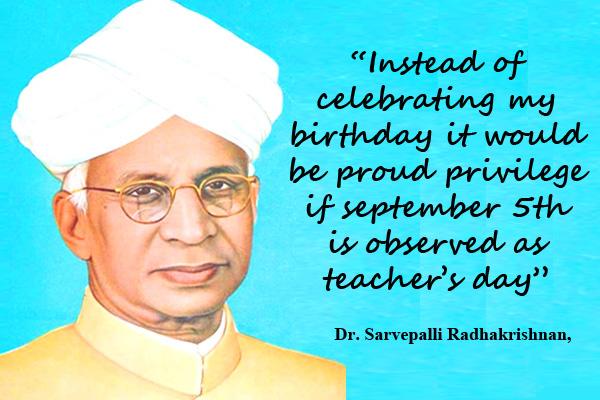Teachers’ Day on the occasion of birth anniversary of second President of India Dr Sarvepalli Radhakrishnan

The former president's birth anniversary, on September 5, is observed as Teachers' Day in India.The tradition of celebrating Teachers' Day started in 1962 in honour Dr Sarvepalli Radhakrishnan and teachers across the country. But, why is Teachers’ Day commemorated on his birthday? There is an interesting story behind this.
Before taking a plunge into politics, Radhakrishnan served as a professor at various colleges and universities, including Chennai’s Presidency College and Calcutta University. As his teaching career progressed, he went on to serve as vice-chancellor of Andhra Pradesh University, Delhi University and Banaras Hindu University. He received a proposal from Oxford University in 1936 to teach Eastern Religions and Ethics. Radhakrishnan accepted the proposal and taught there for several years. Besides teaching, he represented India at the United Nations Educational, Scientific and Cultural Organization (UNESCO) from 1946 to 1952. He was also appointed India’s Ambassador to the Soviet Union, where he served from 1949 to 1952. In 1952, he was appointed as the first Vice President of India and after ten years in the office, he went on to become the second President of India in 1962. In 1962, after he took over as the President, his students approached him, requesting him to allow them to celebrate his birthday. Instead of allowing them to do so, he asked them to observe it as Teachers’ Day.
Since then, Teachers’ Day has been marked every year on his birth anniversary in the honour of all the teachers and professors.
10 Fascinating Facts About Sarvapalli Radhakrishnan
1. Knighthood
His contribution towards the field of education earned Dr. Radhakrishnan several awards, including the Bharat Ratna. He even received the Knighthood from the British emperor King George V in 1931 for his excellence in teaching. Three decades later, Dr. Radhakrishnan was even honored with an 'Order of Merit' by the royal folks of Britain.
2. Templeton Prize
In 1975, towards the end of his life, Radhakrishnan was felicitated with a 'Templeton Prize' by the well-known 'Templeton Foundation'. However, the generous scholar donated the entire amount earned through the Templeton Prize to the 'Oxford University'.
3. His Father's Was opposed To His Education
Dr. Sarvapalli Radhakrishnan was born into an economically backward family in a village around the border of Tamilnadu and Andhra Pradesh. His father wanted him to turn into a priest at a temple rather than study at an institutuion, but destiny had other plans. The young Radhakrishnan enrolled into a school at Thiruthani and eventually became one of the most learned Indians.
4. A Sweet Tribute By His Students
After a teaching stint at Mysore University, Dr. Radhakrishnan was moving to Calcutta on his next assignment. His beloved students bid him farewell by transporting Dr. Radhakrishnan in a flower carriage to the railway station. This carriage was propelled by these students who physically pulled it till its destination.
5. H.N Spalding
A renowned English scholar of the 20th century, named H.N Spalding had become a great admirer of Sarvapalli Radhakrishnan, after hearing the latter's speeches in England. Dr. Radhakrishnan's words motivated Spalding to initiate a chair in the world famous Oxford University in honor of 'Eastern Religions and Ethics'. This division of the Oxford offers grants for those who conduct research on religious studies.
6. Philosophy
Dr. Radhakrishnan had penned various books on philosophy and even taught the subject at the Madras University. He is known as one of the best philosophers India has produced till date and was well-known even overseas. Famous British Philosopher and historian Bertrand Rusell had once said that Radhakrishnan being appointed as the President of India would be the 'Greatest honor to philosophy'.
7. His Tryst With The Soviet Union & UNESCO
Dr. Radhakrishnan was given the responsibility of being India's ambassador to Soviet Union, which was a challenging task. Not many know that he was also appointed the chairman of UNESCO's executive board.
8. Fitting Reply Against Racism
It is believed that during a dinner in London, a British citizen remarked that all Indians are black skinned. Dr. Radhakrishnan gently replied to this comment by saying that "God once baked a piece of bread more than what was needed and it was known as the so called 'negro'. God's next experiment at baking was undercooked, which was known 'European'. The almighty tried a final experiment where he baked the bread to the ideal extent and it was termed 'Indian'.
9. Benaras Hindu University
This eminent teacher was appointed as the Vice Chancellor of 'Benaras Hindu Unviersity' in 1939, when the nation was still under British rule. The British Governor of the region back then, Sir Maurice Hallet, wanted to turn the University campus into a war hospital, which was the latter's way of responding to the 'Quit India Movement' started by Mahatma Gandhi. Dr. Radhakrishnan strongly opposed this politically motivated thought of Hallet, as a result of which financial support to the university was stalled. Dr. Radhakrishnan personally approached philanthropists and thinkers across the country to raise funds, in a bid to keep the university functioning.
10. His Amusing Behavior At The Rajya Sabha
Many have claimed that when the atmosphere inside the Parliament house becomes chaotic with political leaders arguing with each other, Dr. Radhakrishnan used to calm down the heated atmosphere in an unusual way. He would recite verses from the Bhagvad Gita or the Bible to instill discipline within the crowd. Former Indian Prime Minister Jawaharlal Nehru had quoted that 'Dr. Radhakrishnan made the parliament sessions seem more like family gatherings'.